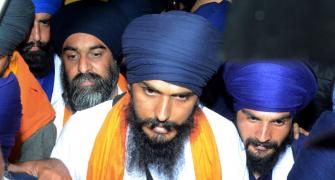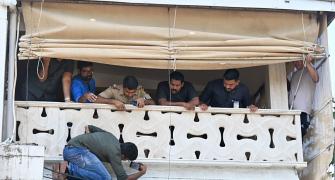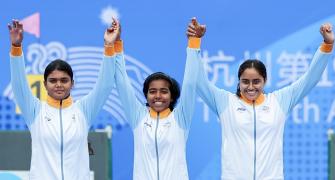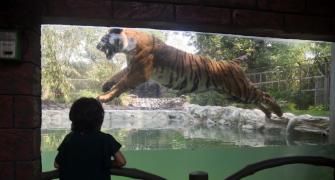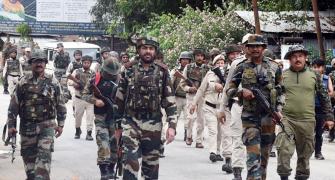A think tank to study India has been set up at the New Mexico Tech University in Socorro, New Mexico.
Dr Bhishma Kumar Agnihotri, India's former ambassador at large for Non-Resident Indians is the senior advisor at the think tank, the Institute for the Geopolitics of India, which is part of the university's Center for Geopolitical Studies.
The Institute, which held its inaugural meeting in New York recently, aims to facilitate the exchange of ideas among policymakers, diplomats and scholars. It will conduct workshops and conferences in India, the US or the European Union on the rapid evolution of India as a power to reckon with in the global arena. Dr Agnihotri told rediff.com that the launch event was held in New York to bring the Institute to the attention of the community, which has a strong representation there.
In his keynote address on 'The Geopolitics of India: Current Impediments, Future Prospects,' he said while there are many fine think tanks -- official and non-official -- there is a need for one that enables Western scholars and policymakers to be apprised of Indian geopolitical perspectives and interests.
The new institute will foster a dialogue between Western and Indian scholars and policymakers. Research findings, scholarly books, opinion pieces, newsletters and reports would find their way to appropriate audiences, he said, adding that fellowships for graduate students, guest lectures and visiting scholars are also being planned.
"The goal of this institute is to address the many issues that face India as it continues to develop its economic capacity and its presence on the world stage," he said.
Highlighting numerous achievements of India and Indians living abroad, he said the continued progress of India depends on various factors, including the preservation of its physical integrity and the unity of her territory.
Quoting studies, he said terrorism, exported by neighboring countries, is a continuing threat to the integrity and social harmony of India.
Also, illegal migration from neighbouring
India's political stability and economic progress also depends on the nation's place on the world stage and likely threats. India's future will be affected by moves made by China, which is not only a major economic power but also has expansionist motives, he said.
Turning to Pakistan, he felt Islamabad may never permit a resolution of Kashmir and would remain a threat to the stability of South Asia.
Recent political developments in Nepal posed significant challenges to India's relations and foreign policy with that country, he continued.
Unless the conflicts and controversies in its neighbourhood are resolved, India's path forward remains challenging, he said. ![]()
Leonard Hochberg, director, Center for Geopolitical Studies, New Mexico Tech, said the Institute would focus on key geopolitical challenges faced by India. Western scholars and policymakers must now develop a direct appreciation of the imperatives of India's national security and the features of Indian society and civilization without being subjected to preconceived notions and ideologically driven judgments, he said.
Steve Emerson, executive director, The Investigative Project on Terrorism, Washington, gave a brief history, causes, and current scenario of international terrorism, and proposed ways India and the US could play greater roles in combating the problem.
Dr Hemant Patel, president of the American Association of Physicians of Indian Origin, said AAPI would work with the Institute to achieve its goals. Others present at the launch included Dr Sudhir Parikh, former president, Federation of Indian Associations, and Rishi Raj, president, American Society of Indian Academics.
(For more information contact Leonard Hochberg at hochberg@ nmt.edu or Manish Srivastava at projectbharat@gmail.com)

